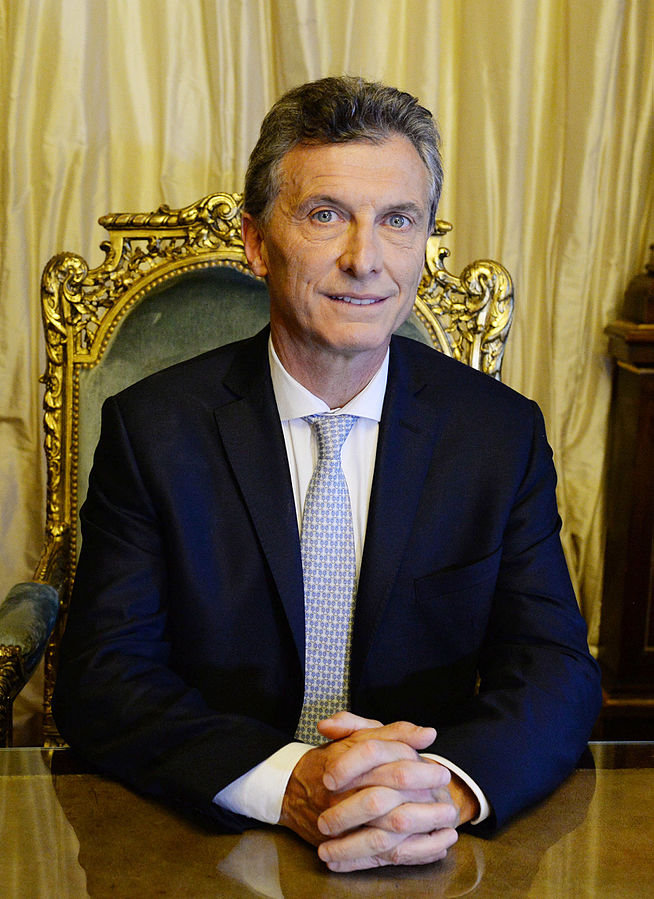News
AP Interview: Argentine leader sees tough road ahead

“There’s no doubt that the world wants to participate and be associated with Argentina,” Macri said at the presidential palace. “We’ve never had this sort of attention.” (File Photo By Casa Rosada/Wikimedia commons, CC BY 2.5 ar)
BUENOS AIRES, Argentina — Argentina’s president is celebrating the successful hosting of the Group of 20 summit, but he said Monday that he is ready for tough times ahead as his country confronts its economic crisis.
President Mauricio Macri told The Associated Press in an interview that he took pride in organizing a secure gathering for the leaders of the world’s largest economic powers where they agreed on a final statement.
Macri said Argentina struck about $8 billion in investment deals with other nations on the sidelines of the summit — most focused on energy, mining and infrastructure.
“There’s no doubt that the world wants to participate and be associated with Argentina,” Macri said at the presidential palace. “We’ve never had this sort of attention.”
Argentina earlier obtained a record $56 billion loan from the International Monetary Fund. But Macri said the country has a long way to go in dealing with its economic crisis following a sharp depreciation of the Argentine currency that he called a “disaster.”
Argentines continue to lose purchasing power to an inflation rate of around 45 per cent, one of the world’s worst. A severe drought has damaged crop yields in the world’s third-largest exporter of soybeans and corn and the peso has depreciated by about half this year.
The economic turmoil has fueled big protests, but Macri insists Argentina is on stronger footing following the IMF loan, support by world leaders at the G-20 meeting and a series of austerity measures aimed at bringing the government’s deficit to zero next year.
“We have to stop spending more than we have,” Macri said. “Naturally, this will lead to lower inflation, which will start to go down in November and December. And we’re working so that like 98 per cent of all other countries in the world, we can reach a single-digit as soon as possible.”
The conservative president took office in 2015 promising to revive Argentina’s weak economy and end poverty.
He has been credited with resolving a longstanding legal dispute with creditors that returned the country to global credit markets for the first time since its worst economic meltdown in 2001-2002. He also removed currency controls and ordered the government to publish credible statistics, which had been disputed by the IMF and analysts under his predecessors.
But in an austerity push, Macri has also laid off thousands of state workers and cut energy subsidies, sending utility bills and bus fares soaring. His ending of foreign exchange controls ushered in the sharp devaluation of the peso.
“Argentines decided to make a change for their future. I know it’s tough right now. For many, it’s tougher than they imagined it would be, but many things happened that were out of our reach,” Macri said.
He declined to provide estimates for economic growth or inflation, citing volatility. Interest rate rises in the United States led investors to pull dollars out of Argentina earlier this year, while the U.S.-China trade war has rattled global markets.
“We no longer make forecasts because the world is changing so much. Perhaps one of our biggest mistakes was to make forecasts,” he said. “Will the inflation be lower? Yes. Will the economy grow again? Yes — slowly. We’ll do everything possible so that it’s as soon as possible, but I don’t want to make any predictions.”
Macri and Chinese President Xi Jinping announced dozens of trade deals Sunday during a state visit following the G-20. China is among Argentina’s top export markets, especially for agricultural commodities that are the engine of its economy, and is also one of Argentina’s biggest lenders.
Xi’s visit came after U.S. officials said they had reached a 90-day truce in the trade dispute with China that has imperiled economic growth. The breakthrough followed a Saturday dinner meeting between Xi and President Donald Trump.
There have been questions about whether Argentina can pull off its strong ties with Beijing without provoking a negative response from the Trump administration.
“I feel comfortable because we have a great relationship with the United States, perhaps the best one we’ve had in our recent history, and the U.S. has been our top investor for many years,” Macri said. “With China, we complement each other because they want what we produce, which is energy and food …
“When people ask me if I’m going to choose between China and the U.S., I say no. I’m going to work with both because both will help us give Argentines an opportunity.”
Macri said he suffers witnessing the effects of the crisis on Argentines. During the G-20, however, he was moved to tears during a cultural event celebrating Argentina. Trump, Germany’s Angela Merkel and China’s Xi were among leaders who gave a standing ovation at the end of the performance at the Colon Theater, the landmark in Buenos Aires that is one of the world’s great opera houses.
“I saw Angela and she was enthralled, and so was Xi and Donald,” Macri said. “Donald even asked me why it had been so short. He wanted it to keep going.”
When artists began to chant “Argentina” on stage at the end of the performance, Macri could not hold back the tears. “I broke down,” he said. “It was impossible not to.”
Macri’s popularity ratings have plunged with the crisis, but he said he will run in next year’s election. His predecessor, Cristina Fernandez, maintains strong support and is tied with him in most polls even as she faces numerous formal investigations into alleged corruption during her 2007-2015 administration.
“It’s logical that someone who already governed has people backing them,” Macri said. “But I don’t think most Argentines want to go back to the past.”





















